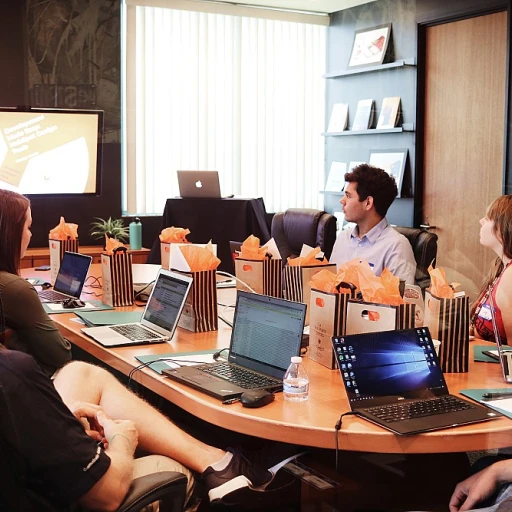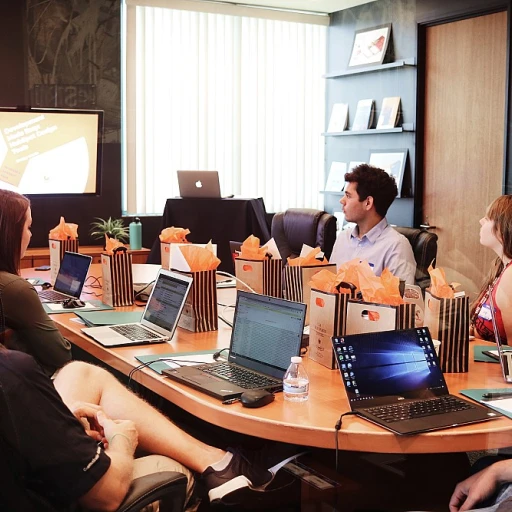Understanding the Importance of Reskilling for Managers
Recognizing the Need for Reskilling in Managerial Roles
In today's fast-evolving workplace, reskilling has become a pivotal aspect of professional development, especially for managers. This transformation is not merely about adopting new technologies or methodologies but involves cultivating an environment where perpetual learning is prioritized. As managers spearhead teams towards collective success, they must also possess the abilities to adapt, grow, and thrive in shifting landscapes.
Understanding reskilling's importance begins with acknowledging that a manager's skills are not static. As the demands of their roles evolve, factors such as leadership, active listening, and problem-solving become more critical to sustaining high performance. These processes involve more than mere chance; they demand strategic frameworks that underscore both long-term career aspirations and short-term goals.
Reskilling equips managers with the competencies necessary for improving team dynamics and enhancing employee engagement. This aligns with performance management goals, allowing managers to offer constructive feedback and guidance tailored to each team member's unique development plan. By placing emphasis on skill enhancement, managers not only bolster their own professional growth but also invigorate the broader team spirit.
For managers committed to honing their leadership skills, adopting a mindset that embraces continuous personal development is indispensable. Studies illustrate that managers who engage in reskilling instill confidence among employees, facilitating smoother transitions during periods of change and uncertainty. This proactive approach not only fortifies their management abilities but also significantly contributes to organizational development.
For an insightful perspective on enhancing leadership skills effectively, particularly in structured environments, this article on a reskilling perspective can offer valuable guidance:
Enhancing Leadership Skills in the Army: A Reskilling Perspective.
Identifying Key Skills for Managerial Success
Identifying Fundamental Competencies for Managerial Excellence
In the ever-evolving landscape of management, certain skills have emerged as pivotal for achieving success and fostering development goals. While the spectrum of managerial capabilities is broad, focusing on key skills is vital for managers striving for professional growth and enhanced team performance.
One essential skill is leadership, a core component that directly influences team engagement and overall work environment. A manager who leads with confidence and direction will facilitate a culture of accountability and motivate team members to achieve their performance goals. Leadership goes hand-in-hand with active listening, another crucial skill. By genuinely valuing employee feedback, managers can gain insights into areas needing improvement and tailor development plans that align with team and organizational objectives.
Time management also plays an essential role in carving out successful managers. The ability to prioritize tasks and manage one's own time efficiently allows managers to guide their team through both short-term goals and long-term challenges without overwhelming their workload.
Moreover, problem solving is a competency that cannot be overlooked. Developing this skill will enable managers to navigate both minor hiccups and major crises with strategic calmness, ensuring continuous workflow.
Professional development focuses not only on acquiring new skills but also on refining existing ones, such as management, performance management, or change management. An ongoing commitment to professional development can lead to a significant transformation in managers' efficacy, contributing positively to their career trajectory.
For further understanding and enrichment of skillsets, enhancing these abilities through
performance management training can provide a structured approach for managers to elevate their roles.
Ultimately, by identifying and nurturing these fundamental skills, managers can craft comprehensive development plans for themselves and their teams, ensuring sustained growth and success within their organizations.
Setting SMART Development Goals
Creating Defined Objectives for Managerial Growth
Setting development goals for managers is crucial to fostering professional growth, enhancing team performance, and ensuring sustainable success in leadership. To effectively reskill and empower managers, it is essential to establish structured and achievable goals. A well-defined development plan allows for better clarity and focus, offering guidance to both managers and their teams.
- S.M.A.R.T. Goals: Ensure that the goals are Specific, Measurable, Achievable, Relevant, and Time-bound. This approach facilitates clear communication of expectations and provides a concrete roadmap for managers to follow.
- Integration with Professional Development: Align goals with both short-term objectives and long-term career aspirations of the managers. This integration helps maintain motivation and encourages continuous personal development.
- Leveraging Management Skills: Goals should encompass critical management skills such as active listening, change management, and time management. These skills contribute to effective leadership and better employee engagement.
Managers who set clear performance goals for their professional development not only enhance their own skills but also strengthen the overall team's capabilities. Through active engagement and feedback, goals provide a clear context for development, facilitating improved performance management and team development.
For more insights into developing effective goals, explore the importance of
goal setting and skill acquisition to foster growth and success in the professional environment. By following these structured approaches, managers can produce a significant impact on work performance and team cohesion, benefiting both the organization and its employees.
Leveraging Technology for Skill Enhancement
Utilizing Technology to Maximize Skill Development
In today's dynamic work environment, leveraging technology has become essential for managers aiming to enhance their team's skill sets. With the right tools, managers can facilitate professional development and ensure every team member continues to grow in their respective roles.
One of the most effective ways technology aids in this endeavor is through online learning platforms. These platforms offer a diverse range of resources, from video tutorials to interactive courses, which are perfectly suited for managers and team members who are looking to cultivate new skills or refine existing ones. This flexibility allows employees to balance their personal development and work commitments more efficiently.
Furthermore, adopting performance management software can provide managers with insightful feedback regarding their teams' strengths and areas for improvement. By analyzing performance data, managers can identify specific short-term and long-term development goals tailored to each employee's career growth. This data-driven approach not only supports the creation of a personalized development plan but also fosters a culture of continuous improvement.
Incorporating technology also facilitates time management by automating administrative tasks, thus allowing managers to dedicate more attention to leadership and team development. Tools that streamline communication and collaboration are vital in ensuring that all team members are actively engaged and aligned with their goals.
Lastly, technology can support the establishment of a strong feedback loop. Continuous feedback is essential for monitoring progress and addressing any challenges that may arise during the reskilling process. By utilizing digital tools for regular check-ins, managers can provide timely support and motivation to their teams, ultimately ensuring a successful reskilling journey.
By embracing technological advancements, managers can effectively steer their teams towards enhanced performance and adaptability, ensuring their long-term success in an ever-evolving professional landscape.
Overcoming Challenges in the Reskilling Process
Conquering Barriers in the Journey of Reskilling
Embarking on the path of reskilling presents a distinct array of challenges, particularly for managers striving to meet their professional development goals.
- Time Constraints: A major hurdle often encountered by managers is time management. Balancing day-to-day responsibilities with reskilling efforts requires a well-structured development plan. Allocating specific periods within the work schedule for skill enhancement can help in achieving both short term and long term goals.
- Cultural Resistance: In certain cases, there may be resistance within the team or organizational culture towards change management. Encouraging active listening and promoting a mindset open to change can aid in overcoming this resistance. Leadership plays a crucial role in fostering a culture that values continuous learning and growth.
- Resource Limitations: Lack of access to adequate resources or training opportunities can impede progress. To navigate this, managers can leverage technology for skill enhancement, utilizing online courses and virtual workshops that offer flexibility and an array of knowledge sources.
- Fear of Failure: Managers may also face an underlying fear of not meeting their performance goals. Creating an environment where feedback is seen as a tool for growth rather than criticism can be instrumental in easing these fears. Aligning development goals with the individual's career aspirations ensures that the journey is both fulfilling and productive.
A well-designed development plan effectively addresses these challenges, providing a roadmap for achieving skills that contribute to both personal development and enhanced employee engagement. By recognizing potential barriers early and implementing strategic solutions, managers can nurture their own growth while simultaneously uplifting their team members.
Measuring Progress and Celebrating Success
Tracking and Reviewing Progress in the Reskilling Journey
In the realm of reskilling, tracking and measuring progress is pivotal. For managers, as they work on their professional development, understanding how close they are to achieving their goals is crucial. By closely monitoring these advances, managers can make timely adjustments to their development plans, ensuring that both short term and long term goals are met.
Progress measurement is not a standalone task. It relies heavily on the engagement of team members and the utilization of effective feedback. Managers should foster an environment of continuous feedback within the team, allowing employees to voice their insights and experiences. This active listening not only enhances employee engagement but also provides managers with valuable performance feedback.
Furthermore, professional development is an ongoing journey. As managers grow their skills in problem solving, leadership, and change management, they must celebrate these achievements, no matter how small. Celebrating success serves as a motivating factor, boosting team development and overall performance.
Here's how managers can measure progress and celebrate success:
- Set specific milestones within your development goals to gauge progress.
- Use performance management tools to track work-related performance goals.
- Incorporate a mix of quantitative and qualitative feedback for a comprehensive view.
- Regularly review the development plan to align with changing roles and responsibilities.
- Encourage team members to share insights on professional development during meetings.
By integrating these practices, managers will not only enhance their own career growth but will also effectively champion the development of their teams. As challenges arise, as discussed in previous sections, this approach will prove invaluable in navigating them and maintaining momentum across all layers of management.














